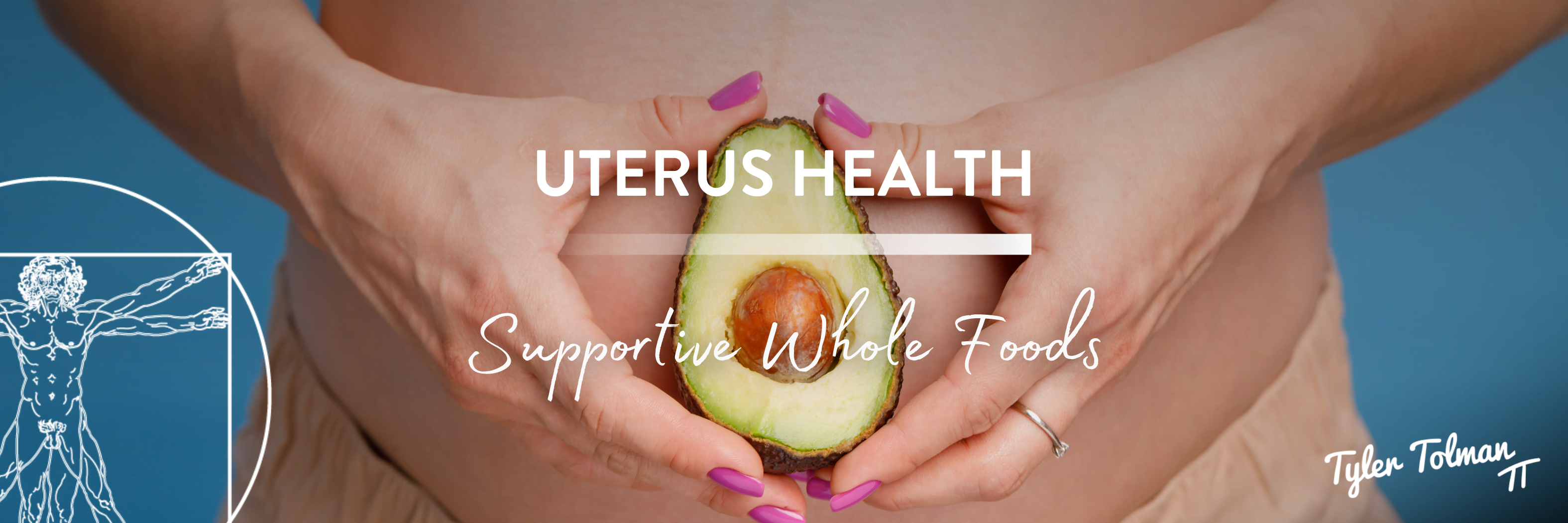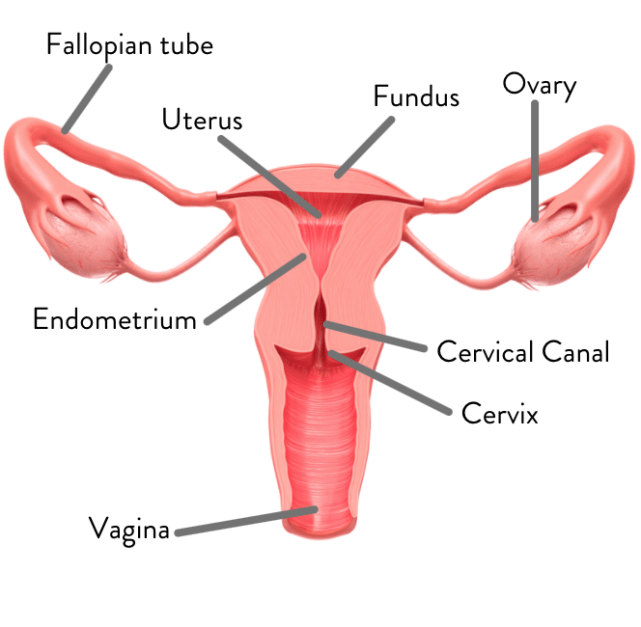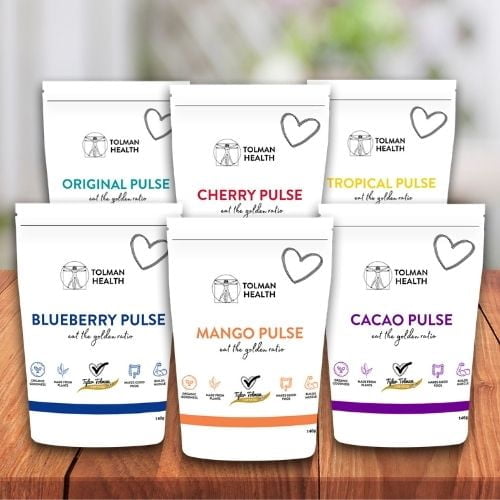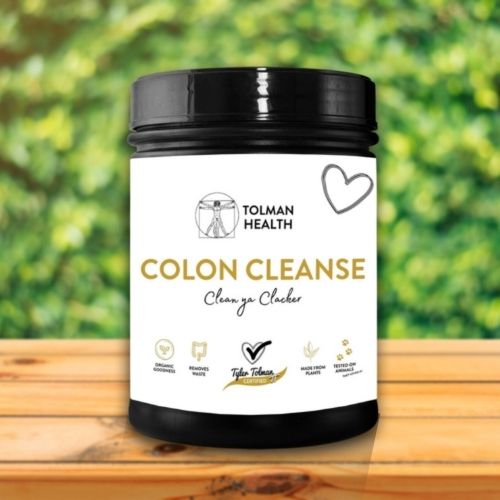TYLER TOLMAN BLOG
Whole Foods to Eat for a Healthy Uterus by Coach Rina Cohen

Whole Foods to Eat for a Healthy Uterus by Coach Rina Cohen
Welcome all genders… Warning, this blog may only interest those with a uterus.
Shorter Oxford English Dictionary defines the uterus as the organ in which the young are conceived, developed and protected until birth.
The word uterus comes from ‘uter’, meaning bag. This female organ of gestation is also known as the womb.
The uterus is a single hollow organ shaped somewhat like a pear. In the non-pregnant condition it is about the size of a small fist, 7.5cm in length and 5cm at its widest point. The uterus lies at the bottom of the pelvic cavity, anterior to the rectum and posterior to the urinary bladder.
The main portion of the uterus is its corpus or body. Above the level of the entrance of the uterine tubes, the rounded portion of the uterus is the fundus. The lower narrow portion is the cervix. Part of the cervix projects into the vagina.
The cavity of the body of the uterus is called the uterine cavity, and the narrower cavity of the cervix is called the cervical canal.
The uterus is an imperative part of the woman’s reproductive system. The ovaries are located on each side of the uterus connected by the fallopian tubes, also the cervix, vagina and clitoris.

The Reproductive System
The female reproductive system is regulated by sex hormones – estrogen, progesterone and some testosterones produced by the ovaries during the menstrual cycle. The principal target for progesterone to the uterus is for completing the preparation of and maintaining the endometrium for pregnancy.
Each month during a woman’s reproductive life, the uterus prepares for a possible pregnancy. Should pregnancy occur, the uterus serves as the incubator for the developing embryo. The tiny embryo implants itself in the wall of the uterus and develops there until it is ready for birth to begin living independently. At that time, the process of labour begins where the uterine wall begins to contract rhythmically and powerfully to push the baby through the birth canal out of the body.
If pregnancy does not occur, all hormones levels drop and some of the endometrial layer begins to shed. This is called menstruation and can last, on average, for 7 days. The cycle then starts over.
Uterus Awareness
Fibroids are benign tumors of the womb and are present in 20% of females of reproductive age. They are growths of smooth muscle and fibrous tissue of varying sizes. They lie under the inner wall lining of the uterus or deep in the muscle wall or near the outer surface. These fibro capsules remain in the uterus and do not spread to other parts of the body.
Fibroids may cause prolonged heavy menstrual bleeding and putting pressure on the bladder cause frequent urination. They may interfere with pregnancy, labor or delivery. A whole food diet will reduce the growth of fibroids, while fasting on juices or water will help to shrink them.
Early stages of uterine endometrial cancers exhibit signs of unusual bleeding or vaginal discharge. A collection of fluid may also occur in the uterus, painful urination, pain during intercourse or pain in the pelvic area may indicate concern.
Smoking cigarettes, multiple sexual partners, low socio economic status and cultural background may increase the risk of cervical cancer.
Early menstration, late menopause, never pregnant, estrogen exposure, estrogen replacement therapy without progesterone, tamoxifen, diabetes, gallbladder disease, hypertension and obesity may increase the risk of endometrial cancer. In the USA, 49,700 cases of uterine cancer are detected each year.
Attention to any symptoms or unusual changes to a woman’s menstrual cycle should be investigated promptly. Treating cancer in its early stages is imperative to healing.
Prevention is the best cure by maintaining a strong and healthy immune system. Living the 7 Principles of Health is the foundation to health and healing:
Clean AIR – regular breath work like Tyler’s 7 Rounds of 7
WATER – drinking clean water in the appropriate amount for your body weight (1L for every 22kgs)
SUNSHINE – nature’s free source of Vitamin D, so get it daily
Eating a WHOLE FOOD diet – fruit, vegetables, nuts and seeds filled with immune enhancing nutrients
EXERCISE to release stress – choose whatever gets you motivated and do it consistently
Quality RELATIONSHIPS – actively participating in building family and friend bonds
Find your PASSION – it will fill your soul
To learn more about these 7 Principles, experience the Tolman Health 3-day H•E•A•L program.
Whole Foods for a Healthy Uterus
In the Doctrine of Signatures, foods that support the uterus/womb are eggplants, pears and avocado – notice the similar shape of these whole foods with the uterus. Bee Pollen is also found to maintain a strong immune system and supports women suffering the side effects of cancer treatments.
Eggplants specifically treat congealed blood affecting the uterus and reduce bleeding in general. Eggplants are high in fibre, potassium, phosphorus, magnesium, folate and are a rich source of bioflavonoids which renew arteries, prevent strokes and other hemorrhages.
Pears, when ripened, yield a sweet and textures taste filled with vitamin C and copper protecting the body from oxygen related damage due to free radicals. Vitamin C stimulates white blood cells to combat infection and viruses.
Bee pollen contains many vitamins, minerals and antioxidants these compound to health benefits such as decreased inflammation and improved immunity, menopausal symptoms and wound healing. I actually sprinkle it on top of my smoothies and coconut yoghurt.
The PERFECT signature match for the uterus though is the avocado. It takes 9 months to grown an avocado from blossom to ripened fruit. The shape of an avocado cut in half with the seed inside looks like a baby in the womb.
Avocado’s contain oleic acid, a mono-unsaturated fat that may help lower cholesterol. They have twice the potassium of a banana and this helps to regulate blood pressure. They are high in fibre and provide folate, Vitamin B6 as well as some iron, copper and magnesium.
How do you like your avocado?
There are so many ways to enjoy this fruit. You can combine them into a smoothie, slice them into a salad or make a delicious dip. Tip: Keep the whole pip and leave it in the avocado dip and squeeze lemon juice on top. This will help to retain its green colour.
My Fav Recipes that will Support the Uterus
Undressed Avocado Salad
2 avocados, peeled and sliced
2 celery stalks, chopped
1 cucumber, diced
1 red capcicum (bell pepper), seeds removed & chopped
1/2 small green cabbage, thinly shredded
2 medium carrots, grated
3 lettuce leaves, torn into pieces
1 pinch of Yummy
Put all chopped vegetables into a salad bowl. Add the avocado last and slowly stir into the salad until ingredients are lightly coated. Yummy!
Pear Juice
5 pears
3 carrots
1 apple
1 pinch of gratitude
Put into your juicer and enjoy!!
Reflections
In researching for this blog I found it interesting that even though the conception of all human begings begins in the uterus, specific information was not abundant. Then I reflected, when I am creative it feels as if the creativity is initiated from the pelvic area. As a female, I feel that my creativity energetically is born from my uterus.
Reflect on the term ‘womb of creation’. There might be some truth as to where creativity and growth truly start from. I invite you to become the passive observer of your body and check in as to where the creative source might just be emanating from within your body.
In summary, the uterus is our first home where our environment fully supports, nourishes and nurtures us. There might just be a life lesson here. Your environment must support you to fully grow, the food from the environment must nourish you and always nurture yourself and know when it’s time to step out of your comfort zone and start fresh.
Thanks for reading!






